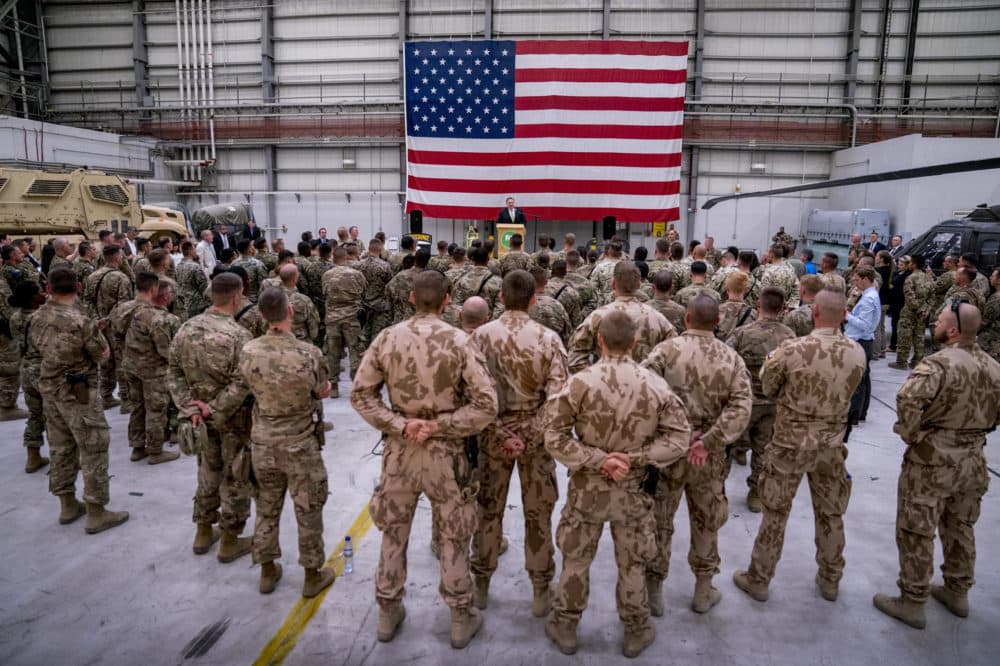Advertisement
A History Of Western Engagement With Afghanistan — And Where The U.S. Fits In Now
Resume
With Meghna Chakrabarti
There’s been blowback following almost every Western engagement with Afghanistan. What are the lessons of history as the U.S. considers pulling troops out this time?
Guests
Thomas Barfield, anthropology professor at Boston University (@BU_Tweets). He researches systems of local governance and dispute resolution in Afghanistan. Author of "Afghanistan: A Cultural and Political History."
Aaron B. O'Connell, professor of history at the University of Texas, Austin. Colonel in the Marine Corps reserve. He served in Afghanistan as special adviser to Gen. David Petraeus and later to the chairman of the joint chiefs of staff, from 2010 to 2011. Former director of defense policy and strategy on the Obama administration's National Security Council. Editor of "Our Latest Longest War: Losing Hearts and Minds in Afghanistan." (@OConnellAaronB)
From The Reading List
Los Angeles Times: "Opinion: The war in Afghanistan isn’t a ‘stalemate.’ The U.S. has lost" — "With the sole exception of Vietnam, the ongoing Afghanistan war represents the greatest failure in U.S. military history. Today, all but a few diehards understand that Vietnam was a debacle of epic proportions. With Afghanistan, it’s different: In both political and military circles, the urge to dodge the truth remains strong.
"This may explain, at least in part, why the present commander in chief has yet to visit the war zone. For a president with an aversion to accepting responsibility, traveling to Afghanistan would call attention to a situation he prefers to ignore. After all, Donald Trump campaigned against the war and vowed if elected to end it forthwith. Once in office, however, he caved in to advisors urging him not only to continue the war but even to dispatch a contingent of reinforcements. Steering clear of Afghanistan allows Trump to sustain the pretense that the war is not actually his.
"If only by default, it becomes incumbent on the military itself to explain what’s going on. With the Afghanistan war in its 18th year, Gen. Joseph Dunford, chairman of the Joint Chiefs of Staff, characterized the war as a 'stalemate' last month. Other high-ranking officers regularly use the same term."
CNN: "The evolving face of the US mission in Afghanistan" — "Lieutenant Colonel Keith Benedict and Private First Class Brennen Bledsoe — two different soldiers with very different stories — are both fighting America's longest war in Afghanistan.
"'It's a privilege to lead soldiers in combat,' Benedict said on a crystal clear day at Kandahar Airfield. 'I think the fact that we have not had an attack in the United States since 2001 is testament to the fact that what we are doing here is working, and I am committed to doing everything I can while I am on ground here to achieving that.'
"Benedict is on his fifth deployment. He joined the military a month before 9/11 and deployed to Iraq in 2006 and 2007 and then to Haiti in 2010. He is now on his third deployment to Afghanistan.
"Bledsoe is on the same base. He was 3 years old when the 9/11 attacks happened and is on his first deployment.
"'I have a great group of guys that I am with, and I love being with them,' Bledsoe said. 'The training we get, the mission we are on, I feel like I am actually doing something for my country, and I am helping out Afghanistan. I am protecting my country, and it means the world to me.'
"These soldiers represent the evolving face of the US mission in Afghanistan over the 17-year long war — from a mission to capture or kill Osama Bin Laden and al Qaeda's leadership to an effort to defeat the Taliban. In 2013, Afghan forces officially took the lead in fighting for the country's security, and the US mission shifted again to counterterrorism as well as advising and training the Afghan forces."
Washington Post: "‘We gave more than enough sacrifices’: Afghans blast Trump’s praise of the Soviet invasion" — "Afghan officials on Thursday denounced President Trump’s praise of the 1979 Soviet invasion and occupation of their country, which he described this week as a fight against terrorism, breaking with decades of Republican anti-communist dogma.
"According to the revisionist historical account Trump delivered during a Cabinet meeting Wednesday, 'the reason Russia was in Afghanistan was because terrorists were going into Russia.' He added: 'They were right to be there. The problem is, it was a tough fight.'
"The comments marked a surprising split with U.S. conservatives dating back to President Ronald Reagan, who saw the invasion as an attempt to spread communism and aided insurgent forces fighting Soviet troops."
Anna Bauman produced this show for broadcast.
This program aired on January 7, 2019.